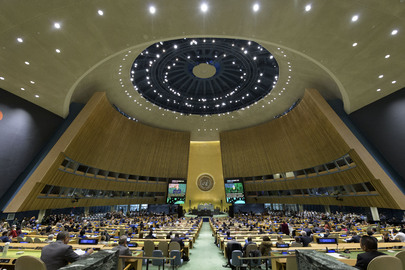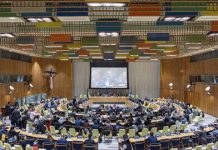Kyrgyzstan: Death penalty reintroduction would violate international law, Türk warns
The UN High Commissioner for Human Rights on Monday called on the authorities in Kyrgyzstan not to reintroduce the death penalty following the rape and murder of a girl there last month.
Volker Türk warned that this would be a serious breach of international law.
Kyrgyzstan stopped using capital punishment in 1998 and then permanently prohibited its use in law in 2010, when it ratified the Second Optional Protocol to the International Covenant on Civil and Political Rights (ICCPR).
According to Mr. Türk’s office, the Kyrgyz authorities want to amend the Constitution to allow the use of the death penalty for cases including the rape of a child. They have also proposed that the country withdraws from the optional protocol.
These rights “cannot be taken away, no matter the justification that is offered”, the High Commissioner said. He added that no justice system is perfect, and if the death penalty were reintroduced, it would in time lead to the death of innocent people at the hands of the State.
$31 trillion debt is holding back developing countries: UN trade summit
Holding the line on the existing rules-based international trading system remains an essential challenge if the world is the keep a damaging tariff war at bay, top UN trade official Rebeca Grynspan said on Monday.
Speaking in Geneva, she said that 72 per cent of global trade “still moves under WTO rules” – a reference to the World Trade Organization, whose agreements are negotiated and signed by trading nations.
She insisted that the world has “for now avoided the domino effect of tariff escalation that once brought the world economy to its knees in the 1930s”.
At the same time, global economic uncertainty is holding back growth, she said:
“Freight costs are now too volatile, hitting landlocked countries and small island developing states with transport bills up to three times the global average. And while AI promises to add trillions to global GDP, fewer than one-third of developing countries have strategies have strategies to capture any of its benefits.”
Also speaking at the UNCTAD conference, President of the General Assembly Annalena Baerbock said that public debt held by developing countries amounted to $31 trillion last year.
So, instead of being able to invest in their people’s future “by building more schools or expanding healthcare facilities, many governments are instead spending precious funds on servicing debt”, she added.
Sudan: limited aid access is life-threatening, aid teams warn
To Sudan, where the people of government-held El Fasher in the west of the war-torn country remain trapped without food, water or medical care, UN aid coordinators, OCHA, said on Monday.
The warning from the UN aid office, OCHA, follows ongoing and repeated attacks on El Fasher, which is under siege by the paramilitary Rapid Support Forces.
Ten days ago, the Darfuri city’s Daraja Oula neighbourhood was targeted in a drone strike, killing at least 57 civilians who’d been displaced by the war.
Almost 30 months of war in Sudan have left nearly two in three people in dire need of humanitarian assistance, including 16 million children.
Famine has been confirmed in various parts of the country and millions remain at risk of starvation.
Meanwhile, disease outbreaks are compounding the crisis, alongside worsening climate shocks, OCHA says, with more than 3,400 deaths from the ongoing cholera outbreak since July 2024 and over 120,000 suspected cases today.
Daniel Johnson, UN News.
Source of original article: United Nations (news.un.org). Photo credit: UN. The content of this article does not necessarily reflect the views or opinion of Global Diaspora News (www.globaldiasporanews.com).
To submit your press release: (https://www.globaldiasporanews.com/pr).
To advertise on Global Diaspora News: (www.globaldiasporanews.com/ads).
Sign up to Global Diaspora News newsletter (https://www.globaldiasporanews.com/newsletter/) to start receiving updates and opportunities directly in your email inbox for free.






























